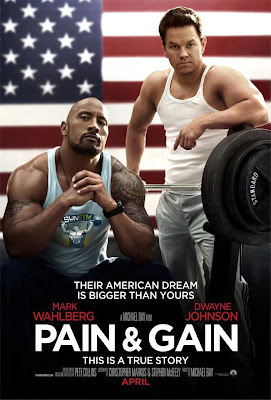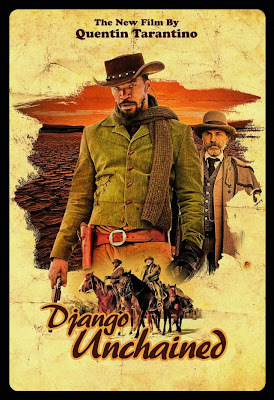‘Les Miserables’ Is Bombastic, But Sure To Please Audiences
Les
Miserables:
3 ½ out of 5
Fantine:
I dreamed a dream in times gone by, when hope was high and life worth living.
Right off the bat, I should say that between the novel by Victor Hugo,
the stage play, and previous film adaptations, I am quite familiar with the
story of Les Miserables. The idea of a big-budget film musical, with
an A-list set of actors, and an Oscar-winning director certainly sounds like a
success story in the making, and I think in a lot of ways this film works and
is sure to get a lot of support from audiences.
At least two performances are absolutely wonderful, the music is of
course great, and from a production standpoint, there is a lot of ambition to
be seen. Still, it is very clear that director
Tom Hooper very much wanted to direct the hell out of this film and goes pretty
overboard with his visual touch on this film.
As a result, the film is hindered by its overall presentation,
especially as it attempts to rush through so many events during much of its
runtime. It will end up being dependent
on the viewer as to whether or not this version of Les Mis does right by them, as it still does have stirring musical
numbers.
The story revolves
around Jean Valjean (Hugh Jackman), a Frenchman imprisoned for stealing a loaf of
bread, who has broken his parole and must flee from police Inspector Javert
(Russell Crowe). The pursuit consumes both men's lives, as Valjean is
constantly on the run, with Javert never wavering in his search. During this time Valjean is able to become a
successful factory owner, where his story intersects with Fantine (Anne
Hathaway), a struggling factory worker.
Later on, Valjean becomes the guardian of Fantine’s daughter, Cosette
(played by Amanda Seyfried, as she gets older) and has vowed to protect her at
all cost. After decades on the run,
Valjean finds himself and Cosette in the midst of the 1832 June Rebellion in
Paris, which is made more complicated by the continued presence of Javert, as
well as the love that is shared between Cosette and a young revolutionary,
Marius (Eddie Redmayne). For all the
fighting, dreaming, hoping, and loving that occurs in this story, it comes down
to whether or not we appreciate being able to hear the people sing.
Did I mention this
movie is a musical? If not, you will be
aware of that within seconds after the film begins, because once the singing
starts, it does not stop. This is
certainly not a knock against the film, as that is what it is being told as and
the fact that the songs and music are good-to-great is a very fortunate
thing. The added quality of having a
naturalistic approach to how the songs were preformed was certainly an
interesting aspect as well. Director Tom
Hooper’s decision regarding the musical numbers in this film was to have the
actors actually perform the songs live, adjusting as they sang, allowing for
moments of emotion to be reflected in their voices. For a number of the actors, this is easily
something that brings a lot out in their performances, because instead of simply
hearing pre-recorded songs acted out by the performers who are lip-syncing, you
literally get to see actors pouring their hearts out, while singing live. It is why Anne Hathaway’s unbroken take of
her singing, “I Dreamed A Dream,” will most likely win her the Oscar.
Now as much as the
naturalistic approach to the music in this film seems like a benefit, that
approach to the direction of this film, in general, feels like an experiment
gone wrong, which is unfortunate. Les Miserables is a film with a huge
scope that seems to have been made incredibly small, given Hooper’s decision to
film everything in either a medium or close-up shot. It is very rare that he seems to want to
acknowledge how grand this film is supposed to be, save for the opening and
closing of the film. Moreover, Hooper
has also decided to fling the camera all over the place, during much of this
film, giving it the sort of aesthetic that feels like something out of the
zanier days of filmmakers like Sam Raimi or Barry Sonnenfeld, rather than a
dramatic, frequently depressing, period musical. The rather overt direction leads to other
issues as well.
Because of the gritty
intensity that Hooper is going for, he is capturing the actors at a level that
is basically too close for comfort. By
that I mean that seeing the actors up close at a constant level, while always
singing, takes away the impact that some of the music should have, because we
can basically glean a lot of the emotions off of their faces, making some of
the songs feel unnecessary in some instances.
I had to confer with a colleague of mind, but it appears most evident
with someone like Russell Crowe. Crowe
is an excellent actor, despite being the poorest singer in this ensemble, and
because of this, his performance has too much nuance to be clearly seen, which
makes Javert come off as an irritating factor, with redundant songs, in a film
that needs, frankly, more of a two-dimensional persona to play this part.
I swear I am getting to
the good in this film, which, despite the subject matter, does have plenty of
potential to be a rousing spectacle for audiences, but there is still another
issue to address. The film feels like it
is in a rush. About an hour in, after we
are given all the time in the world to appreciate a very specific performance,
the film heads into its more revolution-heavy plot line, but never seems to
revive how emotionally charged its extended first act was. Plot points fly by, as we are given many
things to take in and new characters to be acquainted with. It is as if the film seems to lose focus, as
it is more dedicated to making sure we have a good enough idea of the laundry
list of issues and relationships to keep track of, rather than be more focused
on investing us with who really matters.
This makes the most difference once I realized how inconsequential the
film seems to have made Valjean at this point, while the supposed emotional
anchors of the film are barely developed at all, most notably Cosette. While Les
Miserables is certainly a long film, it is still far too speedy in
addressing its own story in a more effective way.
Putting the direction
of the film aside, there are some damn fine performances to watch this film
for. Hugh Jackman is very much in a role
that seems to have been calling on him for a while. Knowing that Jackman is a true theater geek
at heart, it comes as no surprise that he is just wonderful in the role of Jean
Valjean. His musical talents serve him
greatly here, as does his physicality.
Hathaway is equally great in a role that is truly heart-breaking, which
is evident not only due to how she already brings down the house with her
performance that I have already mentioned, but because of how apparent it is
that she is emoting with all she has throughout her screen time in this film. These are the two performances that serve the
film greatly and it is a shame that Hathaway’s work, in particular, causes the
film to peak early.
Other notable
characters are the Thenardiers, played by Helena Bonham Carter and Sacha Baron
Cohen, who serve as both the villains of the film and its only form of comic relief. For those who know the stage version of Les Miserables, it can be argued that
Bonham Carter and Cohen have actually toned down these characters, which is
fitting, given that the film is so burdened by its drama, but at the same time,
“Master of the House” is a pretty jarring song to be fitted in the
narrative. Fortunately, with the overly
ambitious direction being what it is, they are at least performing up to the
level of the film’s standards. Truly catching
me off guard was Samantha Barks as Eponine, the daughter of the Thenardiers,
who gets caught up in the revolution as well.
Barks is a professional singer, who has performed this role on stage
many times, but she really got to me in this film; much more than I was
expecting. I will throw a shout of
praise out to Eddie Redmayne as well, who takes an otherwise bland personality and
invests in him greatly.
It really comes down to
accepting the direction of the film and finding yourself in tune with the
performances in this film. There is
certainly not an issue with acting in this here, as I basically found it to be
too good, given the uncomfortably close camera allowing me to read much more from
the actors than one would generally be accustomed to in a musical. The film does have the benefit of being genuinely
engaging and intensely performed when it is at its best, and still an
interesting musical experiment when it has you looking past its issues. Les
Miserables certainly revels in its ugliness at times as well (I actually
didn’t get to the generally unappealing set design), but it can surely be
described as unapologetic in its presentation.
What does count for a lot though, is that the film reaches its final
moments, features a great number of people singing, and effectively brings up emotions
for not just those on screen. This
somber holiday feature sets its sights high, has some issues akin to Icarus,
but goes out with a “Wow them” sort of ending, so live to dream, I guess.
Chorus: Do you hear the people sing, lost in the valley of the night? It is the music of a people who are climbing to the light.
Aaron
is a writer/reviewer for WhySoBlu.com.
Follow him on Twitter @AaronsPS3.
He also co-hosts a podcast, Out Now with Aaron and Abe, available via iTunes or at HHWLOD.com.
He also co-hosts a podcast, Out Now with Aaron and Abe, available via iTunes or at HHWLOD.com.














Not letting myself read your review until I've seen this, but I'll let you know when I have! Merry Christmas By The Way :)
ReplyDelete